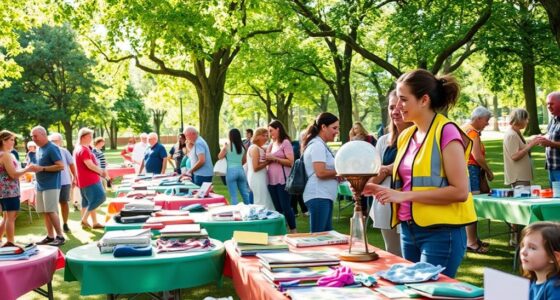Engaging in bartering and skill swaps in your community helps build stronger bonds and nurtures trust among neighbors. You can trade services like gardening for handyman work or participate in time banking to exchange hours of different skills. These exchanges promote inclusivity, resourcefulness, and social cohesion, often facilitated by digital platforms or local events. To discover more ways to strengthen your neighborhood through these methods, keep exploring how others are making these exchanges successful.
Key Takeaways
- Communities are reviving barter and skill swap practices using digital platforms, social media, and local events to facilitate exchanges.
- These initiatives strengthen social bonds, foster trust, and promote inclusivity by enabling residents to share talents and resources without cash.
- Common exchanges include skill swaps like gardening for handyman work, time banking, and direct goods or service swaps at local markets.
- Successful organization relies on clear communication, building trust through transparency, and leveraging technology for coordination.
- Long-term sustainability is achieved by developing partnerships, documenting success stories, and encouraging community participation.
The Rise of Traditional Exchange Methods in Modern Neighborhoods
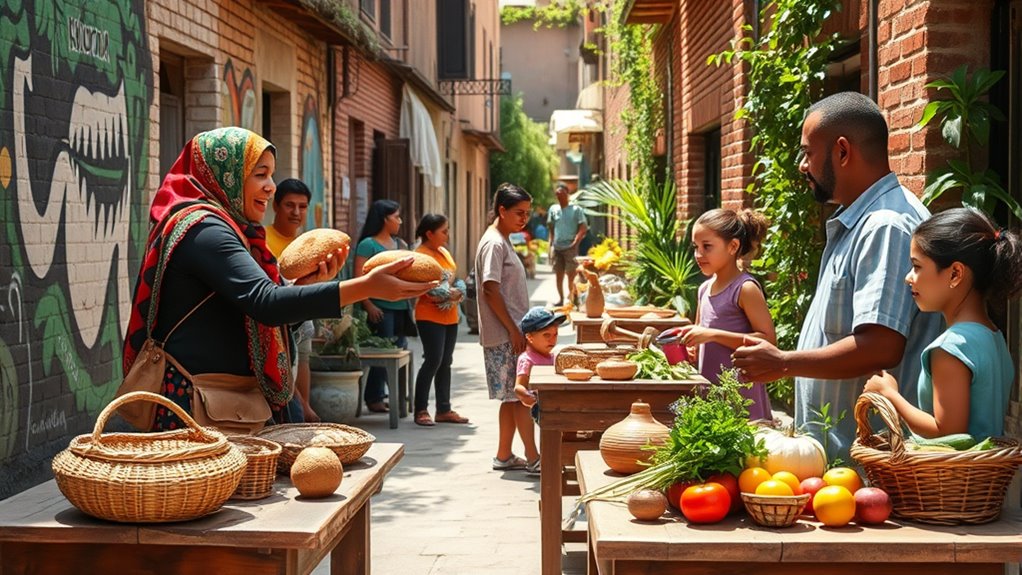
In recent years, traditional exchange methods like bartering and skill swaps have experienced a surprising resurgence in modern neighborhoods. You might notice neighbors trading tools, homemade crafts, or services instead of relying solely on cash. This shift is driven by a desire to build stronger local connections and save money. People are rediscovering the value of mutual aid, where giving and receiving become more personal and rewarding. It’s a way to make the community feel more connected and self-reliant. These exchanges often happen informally, through neighborhood groups or events, creating a sense of shared trust. As digital platforms facilitate these interactions, more residents are embracing the simplicity and community spirit that come with traditional barter systems. Additionally, some communities incorporate cultural festivals and local customs to celebrate their unique identities while engaging in these exchanges. Recognizing the importance of technology integration, many neighborhoods now use social media or dedicated apps to organize and promote their bartering activities more effectively. The rise of community engagement initiatives further encourages participation and strengthens neighborhood bonds. Moreover, understanding the benefits of skill sharing can motivate residents to participate actively in these exchanges, fostering a resilient and supportive neighborhood environment. Furthermore, emphasizing leadership skills within community programs can enhance the organization and success of these barter activities.
Benefits of Bartering and Skill Swaps for Community Building
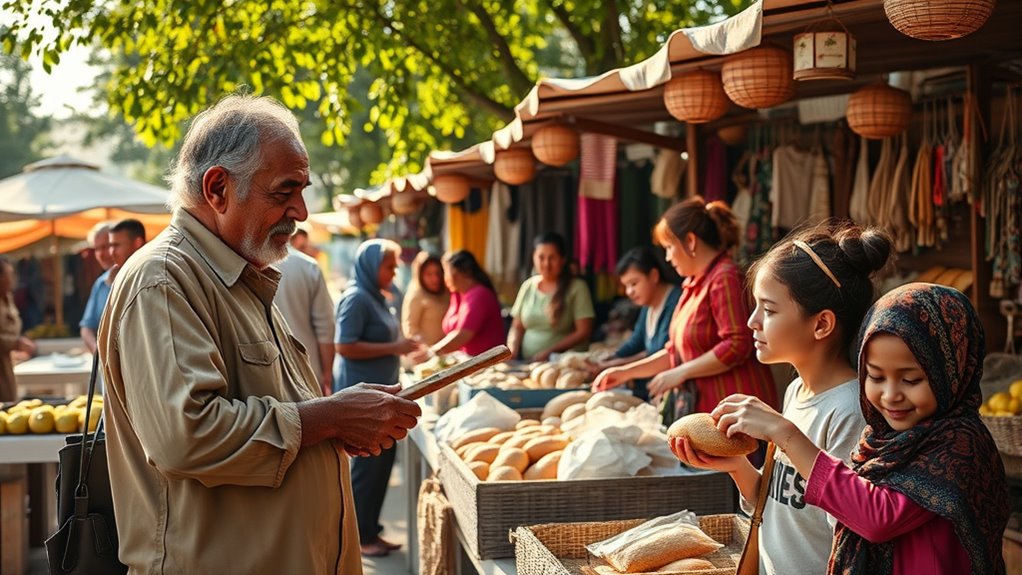
Bartering and skill swaps do more than just save money—they actively strengthen community bonds. When you exchange services or goods directly, you foster trust and create personal connections. These interactions encourage neighbors to work together, building a sense of shared purpose and mutual support. Participating in exchanges helps you discover local talents and resources, making the community feel more vibrant and self-reliant. It also promotes inclusivity, allowing everyone to contribute regardless of income. Over time, these exchanges can lead to lasting friendships and networks that extend beyond the initial swap. By engaging in bartering and skill swaps, you help create a resilient, interconnected neighborhood where everyone feels valued and empowered. Incorporating survival skills like fire-making or water purification into these exchanges can further enhance community preparedness and self-sufficiency, especially when understanding the regulations governing such exchanges. Additionally, leveraging local economies through these exchanges can stimulate community growth and resilience. Developing an understanding of home furnishings and related resources can also help communities optimize their shared assets for better living conditions.
Popular Types of Exchanges and Their Examples

You’ll find that skill swaps among neighbors are a common way to exchange services like gardening for handyman work. Time banking initiatives let you trade hours for a variety of skills within your community, creating a flexible system of reciprocity. Local barter markets provide a space where you can swap goods or services directly, making exchanges straightforward and accessible. For outdoor enthusiasts, exchanging knowledge about tire pressure for gravel can enhance riding comfort and safety. Additionally, understanding how eye patches improve skin hydration and reduce puffiness can be a useful skill in personal care exchanges. Learning about community-based trading systems can further expand your options for skill exchanges and foster stronger neighborhood connections. Incorporating home decor concepts such as wall organization and decorative items can also be part of community exchanges, providing aesthetic improvements alongside practical services. Using AI-driven community platforms can further facilitate these exchanges by connecting neighbors with complementary skills and needs.
Skill Swaps Among Neighbors
Neighbors often find that skill swaps are a practical way to meet their needs without money changing hands. For example, you might trade gardening help for piano lessons or offer to repair a fence in exchange for tutoring your child. These exchanges are flexible and tailored to both parties’ skills and schedules, making them highly efficient. Common swaps include cooking lessons, tech support, pet sitting, or language practice. You benefit by gaining services you need while sharing your expertise, fostering stronger community bonds. Skill swaps among neighbors are typically informal, relying on trust and mutual benefit rather than formal agreements. They encourage resourcefulness and create a sense of camaraderie, helping neighbors support each other with minimal cost and maximum convenience. Additionally, understanding the trustworthiness of the participants can help ensure successful exchanges and maintain positive relationships. Incorporating local knowledge of skills and needs can also improve the matching process for more effective exchanges. Building a foundation of community reputation helps participants feel more confident in engaging in these exchanges and promotes a supportive neighborhood environment. Recognizing the importance of reliable communication can further facilitate smooth and successful skill swaps. Furthermore, being aware of the trust-based nature of these exchanges can help participants establish clear expectations and avoid misunderstandings.
Time Banking Initiatives
Time banking initiatives have gained popularity as a creative way to promote community exchange. They allow you to trade your skills and time instead of money. In a typical time bank, every hour you contribute is equal to one time credit, which you can later spend on services from others. These initiatives foster trust and cooperation within neighborhoods. For example, you might offer gardening help and earn credits to receive tutoring or childcare in return. Here’s a quick look at popular types of exchanges:
| Service You Provide | Service You Can Receive |
|---|---|
| Lawn mowing | Language lessons |
| Babysitting | Home repairs |
| Tech support | Cooking classes |
| Pet walking | Car maintenance |
Time banking enhances community bonds and makes services accessible without cash. Incorporating balanced meals into exchanges can also promote healthier community interactions, emphasizing the importance of nutritious food sharing. Properly managing sprayer maintenance can ensure ongoing success in community projects involving shared resources.
Local Barter Markets
Building on the concept of community exchanges, local barter markets offer a vibrant space for neighbors to trade goods and services directly. These markets typically operate weekly or monthly, where participants bring items they no longer need or skills they can offer. Common examples include farmers’ markets swapping produce, craft fairs exchanging handmade goods, and skill exchange events trading things like carpentry, tutoring, or childcare. Some markets are organized online, making it easier to connect with others in your area. These markets foster trust and community spirit while reducing reliance on money. They also encourage sustainability by reusing items and sharing expertise. Whether you’re swapping fresh vegetables or offering lessons, local barter markets help you build stronger connections and support a resilient local economy.
How to Organize and Participate in Local Skill Exchanges
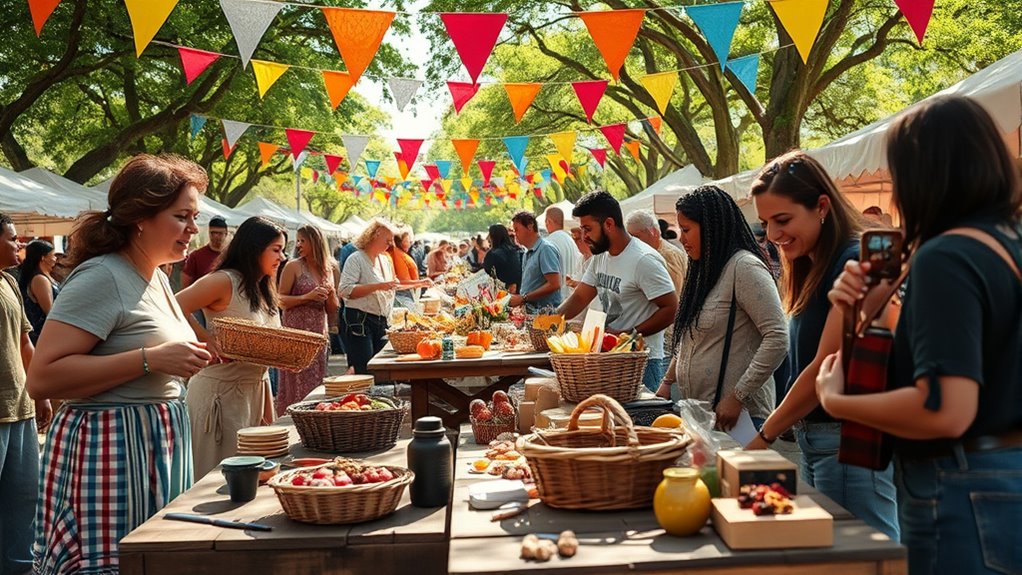
Organizing and participating in local skill exchanges can be a straightforward process when you start with clear goals and open communication. First, identify what skills you want to share and what you’re seeking in return. Reach out to your community through social media, notice boards, or local events to find others interested in swapping skills. Setting simple guidelines helps keep everything fair and organized. Be transparent about your availability and expectations to build trust. To get started, consider hosting a casual meet-up or creating a digital platform for exchanges. This keeps everyone on the same page and encourages ongoing participation.
Start local skill exchanges with clear goals, open communication, and simple guidelines for a fair and engaging experience.
- Define shared goals and skills
- Use social media or community boards for outreach
- Establish clear rules and expectations
Overcoming Challenges and Building Trust in Bartering Networks
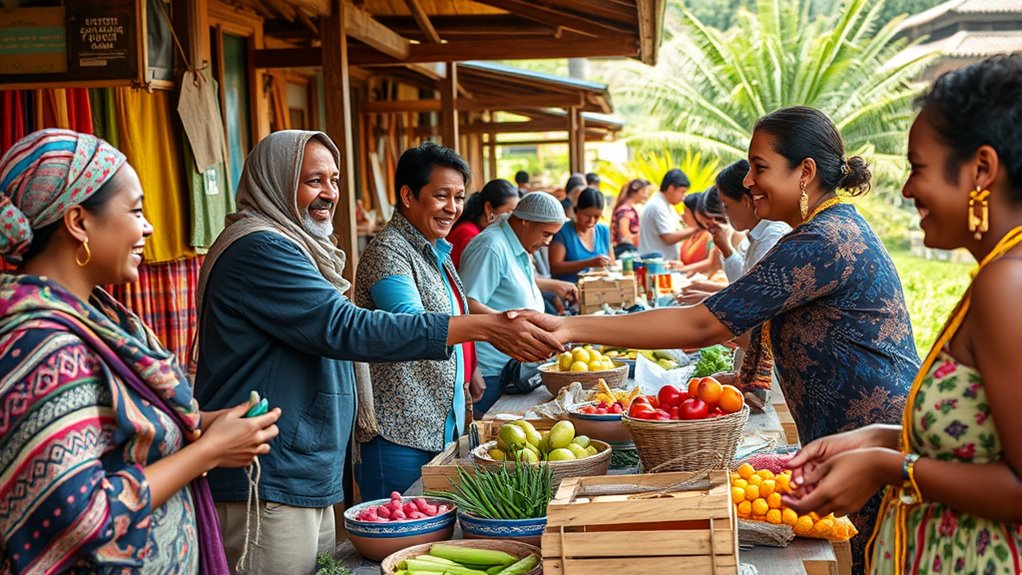
While bartering networks offer valuable opportunities for community connection, they often face challenges like mistrust and misunderstandings that can hinder participation. To overcome this, transparency is key. Clearly communicate the terms of exchanges, ensuring everyone understands what’s being offered and expected. Building trust also involves consistent interactions; the more you engage, the more confidence you develop in others’ reliability. Setting up a verification system, like references or reviews, can reassure members about each other’s honesty. Additionally, establishing agreed-upon rules and mediating conflicts quickly helps maintain harmony. Remember, trust takes time to build, so be patient and open. By fostering open communication and ensuring fairness, you create a resilient network where members feel secure and motivated to participate actively.
Future Perspectives: Sustaining and Expanding Local Exchange Initiatives
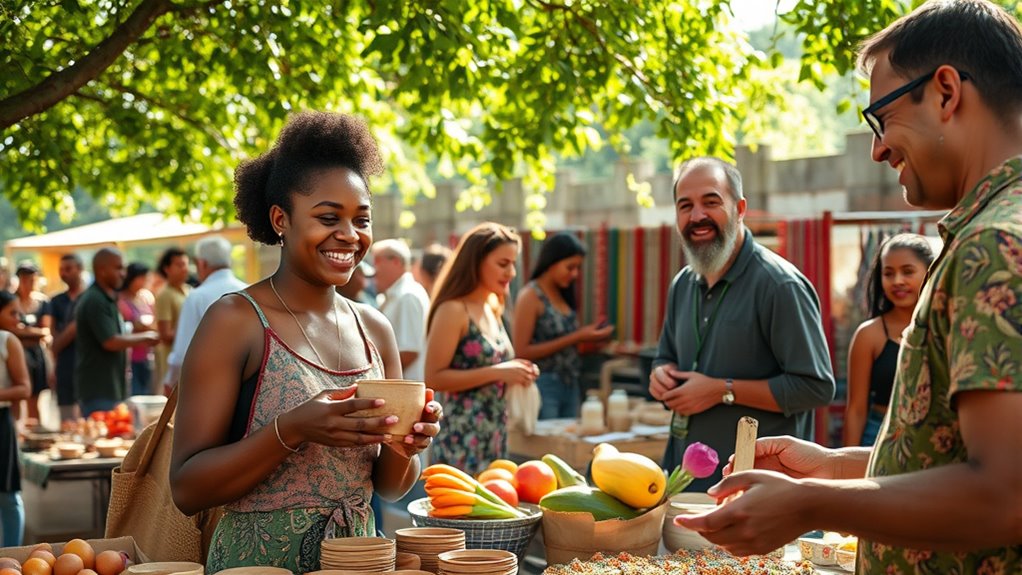
As communities strengthen their bartering networks through trust and transparency, the focus shifts toward ensuring these initiatives endure and grow over time. To sustain and expand local exchange programs, you should prioritize building strong relationships, promoting awareness, and leveraging technology. Encouraging community participation keeps networks vibrant and resilient. Establishing clear rules and fair practices fosters trust and long-term engagement. Utilizing digital platforms can streamline exchanges and reach more people. Partnerships with local businesses or organizations can provide stability and resources. Additionally, documenting success stories inspires others to join and invest in the system. With consistent effort and strategic growth, your community’s exchange initiatives can thrive, creating a resilient, interconnected local economy.
Building trust and leveraging technology ensure the lasting success of community exchange programs.
- Build community awareness through events and outreach
- Use technology to facilitate and record exchanges
- Form partnerships to increase resources and credibility
Frequently Asked Questions
How Do Digital Platforms Facilitate Local Skill Swaps Effectively?
Digital platforms make it easy for you to connect with others who have skills you need. They facilitate effective local skill swaps by providing user-friendly interfaces, matching algorithms, and review systems that build trust. You can quickly find nearby people willing to exchange services, schedule swaps, and communicate seamlessly through messaging features. These tools streamline the process, making skill sharing more accessible, organized, and successful within your community.
What Legal Considerations Exist for Informal Barter Agreements?
Did you know that 60% of informal agreements lack legal clarity? When you engage in barter deals, you should understand that these are usually considered private contracts. You might face issues if disputes arise, so it’s wise to document your agreement clearly. Be aware of tax implications and local regulations—some areas require reporting bartered goods. Always guarantee both parties agree on terms to avoid legal complications.
How Do Cultural Differences Influence Bartering Practices?
Cultural differences considerably shape how you approach bartering, influencing what items or services are valued and how negotiations unfold. In some cultures, you might prioritize personal relationships over strict fairness, while others emphasize formal agreements. You could find that gift-giving, reciprocity, or specific customs play a role in exchanges. Understanding these cultural nuances helps you navigate bartering more effectively, respecting local traditions and building trust during transactions.
Can Bartering Replace Traditional Currency Entirely in Communities?
You wonder if bartering can fully replace traditional currency in communities. While bartering fosters strong local ties and reduces reliance on money, it’s unlikely to replace currency entirely. You’ll find that currency provides convenience, scalability, and stability for broader economic needs. Bartering works well for local exchanges, but a complete switch would be complex, limiting growth and efficiency in larger or more diverse communities.
What Skills Are Most in Demand for Community Exchanges Today?
You’re likely wondering what skills are most sought after in community exchanges today. You’ll find that practical abilities like gardening, carpentry, and tech support are highly in demand. Creative skills such as art and music also attract interest. Additionally, interpersonal skills like teaching, coaching, and language translation are valuable. By offering these skills, you can effectively trade and strengthen your local community, making exchanges more diverse and beneficial for everyone involved.
Conclusion
By embracing bartering and skill swaps, you open a world where neighbors become superheroes, transforming your community into a vibrant, bustling hub of endless possibilities. Imagine a neighborhood so connected that every skill is a treasure, and every exchange sparks a wildfire of trust and friendship. Keep participating, and you’ll witness your local community flourish into a paradise where cooperation reigns supreme—more powerful than you ever thought possible. The future of community is in your hands!


